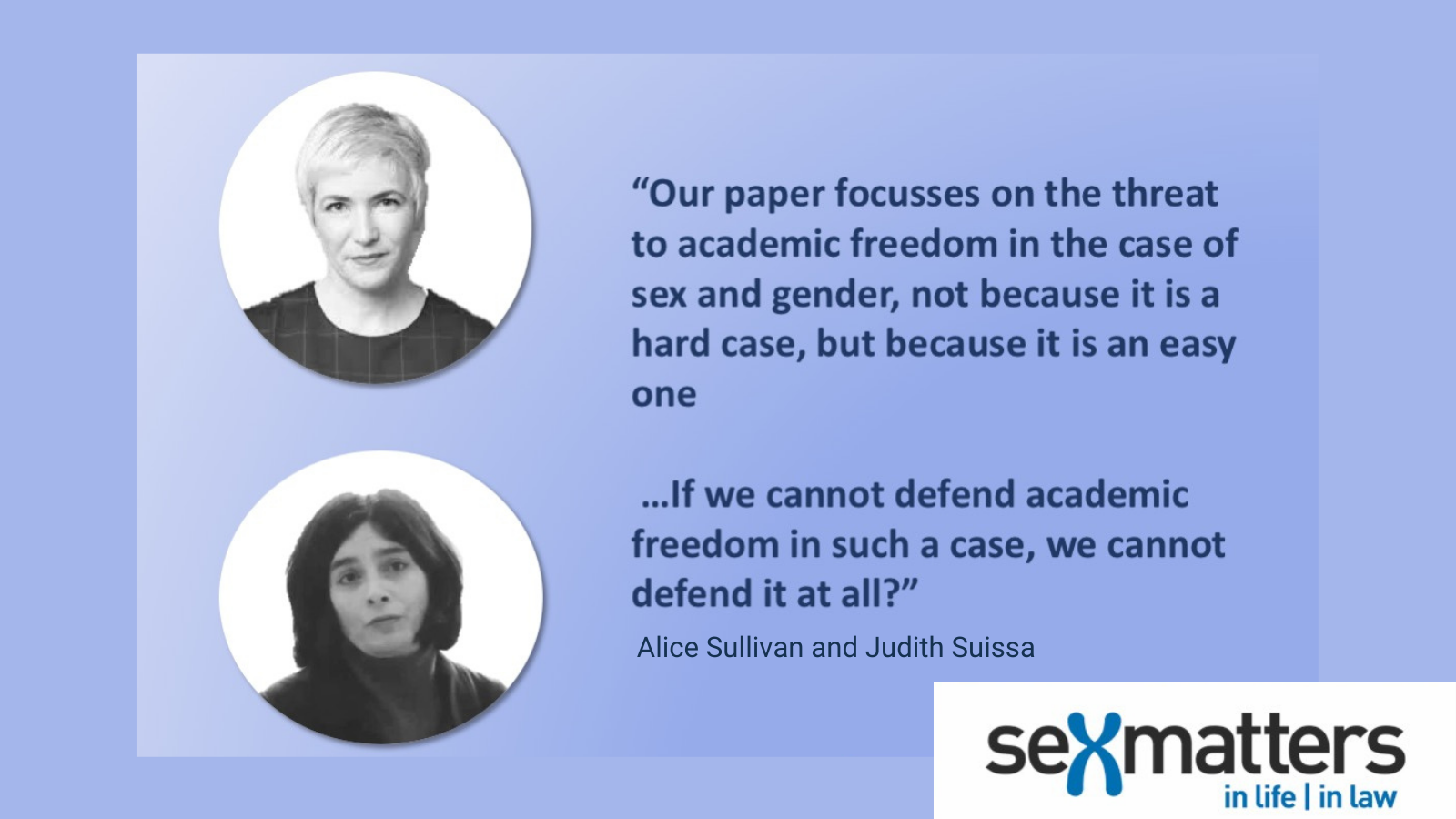The Gender Wars, Academic Freedom and Education
Guest blog post by Professors Alice Sullivan and Judith Suissa


We often hear it claimed that there is no such thing as a crisis in academic freedom and that cancel culture is a myth. Our paper on The Gender Wars, Academic Freedom and Education in the Journal of Philosophy of Education debunks this view, and demonstrates that there is a serious problem with academic freedom regarding the ability to discuss sex, gender and gender identity.
The problem is fundamental and far-reaching. Inevitably so, given that sex is a vital concept across the human and social sciences and the humanities. Gender identity extremists are succeeding in making it difficult for academics to talk about and collect data on natal sex.

“Academic freedom matters for learning…Scholars need to be able to have open conversations, with each other, with students, with policymakers, practitioners and the public”
Professor Alice Sullivan, UCL
(with Judith Suissa)
The suppression of academic freedom is often discussed as though it was all about no-platforming. No-platforming is a disturbing symptom, but it is not the disease. It reflects a chilling climate, which also leads to the suppression of research, and constraints on discussion. Most such incidents go unreported [Sex Matters has a database of stories that have reached the public domain] Similarly, many people reading about such silencing assume that the victims must be bigoted transphobes. But, as our paper explains, merely asserting the reality and significance of sex differences between men and women is now sufficient to attract the charge of “transphobia”.
Why does academic freedom matter?
Academic freedom matters for learning. When we disagree, we try to make sense of the disagreement, clarify what we mean by the terms and positions we describe, explore their implications and reach towards a common understanding, or, at least, a shared view on what it is we disagree about and why.
This activity is precisely what is enabled when the university is really an environment bound not just by the principles of academic freedom, but by a broader commitment to free speech, within the clearly defined boundaries of existing legislation.
Academic freedom is also vital to a functioning democracy. Academics have both a right and a responsibility to produce knowledge as a public good. Scholars need to be able to have open conversations, with each other, with students, with policymakers, practitioners and the public.

“ administrators often make these decisions with more of an eye to ‘risk assessment’ than scholarship… this creates a power imbalance between those who are willing to use intimidatory tactics and those who are not.”
Professor Judith Suissa, UCL
(with Alice Sullivan)
It should be a basic right for all workers to take part in the democratic process without fear of losing their livelihoods. But, for academics, public engagement has a special importance, because it is essential that policy discussions, in the widest sense, are informed by reasoned argument and evidence. When social phenomena cannot be discussed, this should ring alarm bells.
Those who deny that there is a problem tend to ignore the question of who decides who may speak and who is silenced, and how do they decide? Our own experiences suggest that administrators often make these decisions with more of an eye to ‘risk assessment’ than scholarship. In the current climate, this creates a power imbalance between those who are willing to use intimidatory tactics and those who are not.
The need for academics to communicate evidence and rational analysis is all the more apparent when political discussion is constrained by fear and intimidation. Yet universities are not ivory towers: the climate of misogyny and silencing in society affects us.
The policing of women’s language and political activity is particularly evident within the Labour movement. However, parliamentarians across the political spectrum are reported to be afraid to speak their views on these matters.
Prominent legal cases such as those of Maya Forstater and Allison Bailey show that women risk disciplinary action at work, and the loss of their livelihoods, for talking about the reality of their sexed bodies. Many more women simply remain frightened and silent.
In this climate, universities need to provide a space for reasoned analysis and debate. So, what can be done? Academics (especially male academics) could start by ceasing to deny that there is a problem, simply because they personally haven’t experienced it, and by paying attention to the substance of the disagreement between colleagues caught up in these debates.
Institutions need to give serious consideration to whether some of the organisations they work with operate in a way which is incompatible with the core value of academic freedom. Lobby groups such as Stonewall and Gendered Intelligence provide training at many universities, and influence university policies, yet these organisations promote a particular perspective on gender and face serious criticisms for their role in silencing debate.
A commitment to free speech and academic freedom does not constitute a defence of harassment or attempts to close down the speech of others. Universities must take appropriate disciplinary action against students and staff who engage in harassment and intimidation.
Many academics have only recently become aware of the political project to deny the material reality of sex, and the restrictions it aims to place on the conceptual and empirical landscape. Our paper focusses on the threat to academic freedom in the case of sex and gender, not because it is a hard case, but because it is an easy one, with implications across the disciplines. If we cannot defend academic freedom in such a case, we cannot defend it at all.
Suissa, J., & Sullivan, A. (2021). The Gender Wars, Academic Freedom and Education. Journal of Philosophy of Education.
